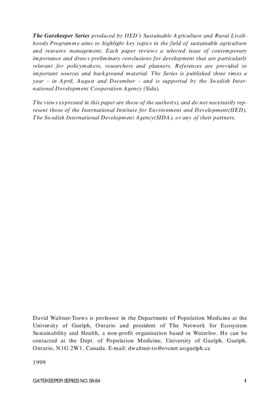
The emergence of human disease epidemics can, in many instances, be interpreted as symptoms of serious malfunctions of agriculture and food systems designed to meet food production and economic goals. This paper presents three recent examples of this: bovine spongiform encephalopathy ('mad cow disease') in the UK, cyclosporiasis in Guatemala and North America, and malaria in Honduras. These epidemics illustrate how programmes to achieve laudable, but simplistic goals such as increasing production or improving health, may work through feedback loops across economic, ecological and disease 'domains' to produce unexpected and undesirable 'side-effects'. These side-effects are likely to keep emerging as long as simple, one-perspective changes are made within our increasingly complex agri-food systems. ~Disease problems in urban consumers are often signals that there are underlying problems in the complex socio-ecological system in which the food is being produced. Responses to these should take the approach that these are not merely 'food industry' problems, but socio-ecological problems: Research and decision-making needs to make a habit of considering the larger context within which particular problems occur, and try to see that context as a system of linked influences. Suggestions are made as to how this can be done. Policies need to ensure the maintenance of feedback loops between economic activities and ecological outcomes. In practice this means protecting the integrity of local ecosystems and the communities in them so that farmers and markets may respond in a timely fashion to changes in their social and ecological context. In several instances, a community-based, participatory, systemic process (Adaptive Methodology for Ecosystem Sustainability and Health, or AMESH), is proving to be useful in helping communities address these issues.
Cite this publication
Available at https://www.iied.org/6152iied